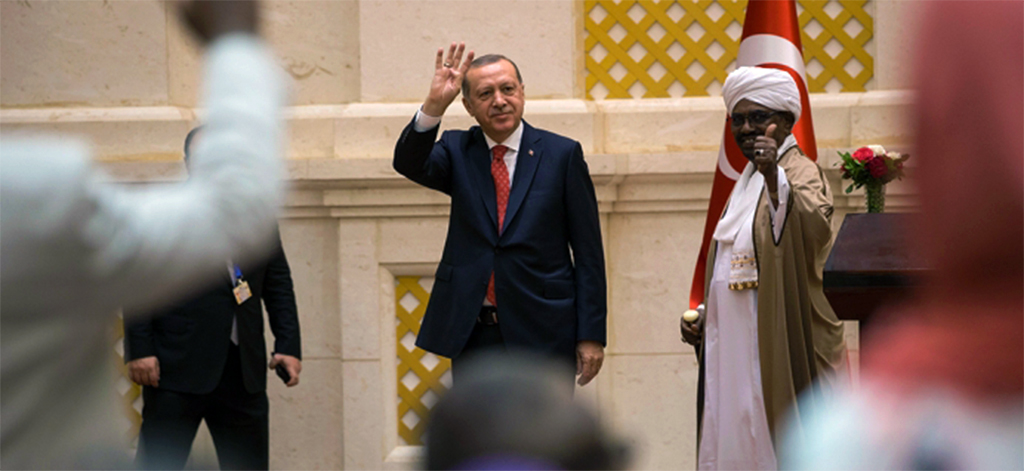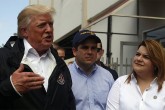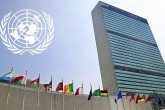President Recep Tayyip Erdoğan travels to Sudan, Chad and Tunisia this week as part of his final international trip of the year. The purpose of his current tour is to deepen Turkey’s African initiative by strengthening Ankara’s economic and defense cooperation with the three countries. As a matter of fact, Turkey and Sudan agreed to establish a High Level Strategic Cooperation Council and signed 12 cooperation agreements. The Turkish president received a warm welcome in Khartoum, Port Sudan and Sawakin, where local communities welcomed him with “Your homeland Sudan” posters.
Again, President Erdoğan was repeatedly interrupted by applause and takbirs during his address to the Sudanese parliament. To be clear, the Sudanese people’s warm welcome wasn’t just a reflection of the historic ties between the two countries. At the same time, it was important that Mr. Erdoğan became the first-ever Turkish president to visit Sudan – along with a commitment to increase bilateral trade from $500 million to $10 billion and Turkey’s support to Khartoum at a time when Sudan faces immense isolation in the international arena. Although economic sanctions have been lifted, Sudan’s political isolation continues.
However, what really attracted the Sudanese people was Mr. Erdoğan’s approach to politics and his leadership role in recent years. The Turkish president, a vocal critic of the unfairness of the international system, has been promoting cooperation on the basis of respect for the sovereignty of African partners by rejecting colonial hegemony. He has asked Turkey’s allies in Africa to work with the Turks against “modern imperialists.”
More importantly, the Sudanese people appreciated Mr. Erdoğan’s diplomatic efforts at the Organisation of Islamic Cooperation (OIC) summit in Istanbul and the U.N. General Assembly regarding the status of Jerusalem. The Turkish president identified Israeli expansionism and oppression as a threat to all of humanity and called on U.S. President Donald Trump to rescind his misguided decision to recognize Jerusalem as Israel’s capital. Speaking at the Sudanese Parliament, President Erdoğan stressed that all of humanity, including Muslims and Christians, had a say about the situation in Jerusalem and criticized the Trump administration for taking unilateral steps and ignoring Israel’s oppressive practices in Palestine. Once again, he declared that the world is “bigger than five.”
It doesn’t take a genius to understand that the Americans are unsettled by President Erdoğan’s criticisms against the United States. However, President Erdoğan speaks for the international community when he shares his concerns about the Trump administration’s most recent steps in the Middle East – just as his critique of the Western-centric world system was shared by various communities. This is the truth that some Western media outlets, which has been trying to depict Mr. Erdoğan as an authoritarian Islamist who is responsible for Turkey’s supposed drift from the West, have been trying to hide. Today, the Turkish president pushes for a better and more just world whilst pledging to pay the price of challenging oppression. Needless to say, his vocal criticism provides Turkey with immense rhetorical ammunition in an increasingly chaotic world.
At a time when the Trump administration pledges to strip Washington of its global responsibilities and implement a policy of economic nationalism, Mr. Erdoğan’s discourse bears particular importance. He not only promises economic welfare on the basis of equality to people around the world, who want an “honorable” relationship with the West, but also warns Europe and the United States against the problems they will create by failing to respect the rights of other communities.
Moving forward, world politics will be dominated by a power struggle geared towards “economic security” – as the Trump administration’s national security strategy suggests. Although international organizations like the World Trade Organization (WTO), which facilitate global trade, will be protected to some degree, the great powers, including the United States, will focus on their national interests at the expense of international norms.
This new period’s discourse will be shaped by each country’s own greatness. To be clear, Russian President Vladimir Putin had made that decision long before Mr. Trump. Under the circumstances, the Turkish president’s rhetoric represents an effort to strengthen Turkey’s economic cooperation with various countries on the basis of fairness and for Ankara to assume a new role in the great power rivalry. Such steps will inevitably mean that Turkey will deal with some turbulence caused by the changing nature of its relations with the United States.
[Daily Sabah, 27 December 2017]
In this article
- Opinion
- 2017
- Africa
- Al Quds
- Daily Sabah
- Donald Trump
- Europe
- Islam
- Islamic
- Israel
- Jerusalem
- Khartoum
- Middle East
- Muslim
- National Security Strategy (NSS)
- Organisation of Islamic Cooperation (OIC)
- Palestine
- Port Sudan
- Recep Tayyip Erdoğan
- Russia
- Sanctions
- Sawakin
- Status of al Quds
- Sudan
- Sudanese People
- Terror
- The President of the Republic of Türkiye
- The status of Jerusalem
- Trump Administration
- Tunisia
- Turkish Foreign Policy
- Turkish President
- Turkish-American Relations
- Türkiye-US Relations
- Türkiye's Foreign Policy
- U.N.
- United Nations (UN)
- United Nations General Assembly (UNGA)
- United States (US)
- US President
- US Sanctions
- Vladimir Putin
- Western Media
- Western World
- World Trade Organization (WTO)
- Your homeland Sudan



